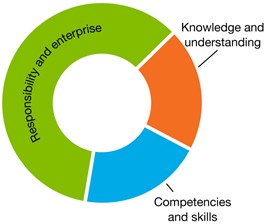Explore content
Digital Technologies
The Australian Curriculum: Technologies has a significant role in developing consumer and financial literacy in young people. The Digital Technologies subject supports the development of the dimensions of consumer and financial literacy as shown in the diagram below.

Approximate proportion of the dimensions addressed in Digital Technologies
Digital Technologies provides an opportunity for students to develop the skills of collecting, managing and analysing data. These skills are underpinned by the understanding students develop about data representation. The focus on computational thinking in Digital Technologies can be applied in a range of financial contexts. In particular, the skills used to analyse patterns and trends and process data equip students with capacities to make reasoned financial decisions, such as selecting investments. Students also learn to interact responsibly and safely in online environments using appropriate technical and social protocols. These skills have application in a number of real-world contexts such as internet banking and identity protection, using mobile phones and establishing the best data plan for particular needs.
Moneysmart for teachers and Tax, Super and You provide a number of interdisciplinary units and interactive activities that provide opportunities to include aspects of the Digital Technologies subject.
Collecting, managing and analysing data
Acquire data from a range of sources and evaluate authenticity, accuracy and timeliness (ACTDIP025)
Analyse and visualise data using a range of software to create information, and use structured data to model objects or events (ACTDIP026)
Investigating and defining
Define and decompose real-world problems taking into account functional requirements and economic, environmental, social, technical and usability constraints (ACTDIP027)
Evaluating
Evaluate how student solutions and existing information systems meet needs, are innovative, and take account of future risks and sustainability (ACTDIP031)
Collaborating and managing
Plan and manage projects that create and communicate ideas and information collaboratively online, taking safety and social contexts into account (ACTDIP032)

